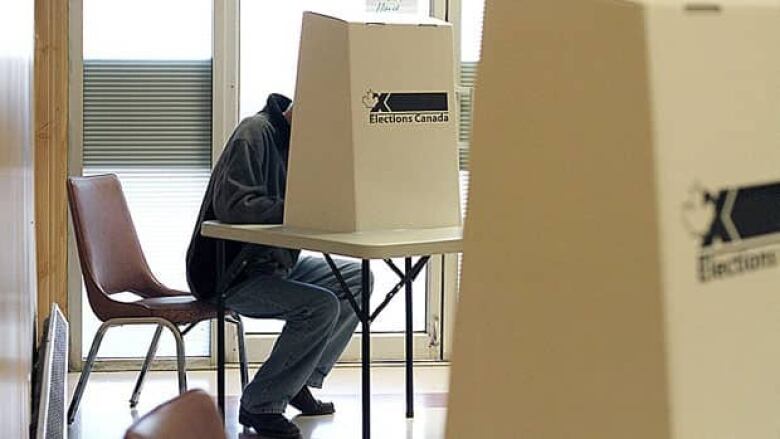Fraudulent election calls 'widespread' in 7 ridings, poll suggests
Group fighting results in 7 ridings says poll shows calls targeted at non-Conservatives

A group supporting a Federal Court challenge of the election results in seven ridings says a new poll it commissioned shows fraudulent election calls were widespread and targeted at people previously identified as Conservative non-supporters.
The Council of Canadians, which announced last month it was supporting an attempt to overturn the election resultsin seven ridings,hired EkosResearch Associates to survey Canadians about whethervoter suppression techniques were used to influence the election results in those ridings.
The poll also looked at whether the techniquesdeliberately targeted supporters of a particular political party.
Nine people are challenging the results of the May 2, 2011 election in the following ridings:
- Don Valley East in Ontario, won by Conservative MP Joe Daniel by 870 votes.
- Nipissing-Timiskaming in Ontario, won by Conservative MP Jay Aspin by 18 votes.
- Saskatoon-Rosetown-Biggar in Saskatchewan, won by Conservative Kelly Block by 538 votes.
- Vancouver Island North in B.C., won by Conservative John Duncan by 1,827 votes.
- Winnipeg South Centre in Manitoba, won by Conservative MP Joyce Bateman by 722 votes.
- Elmwood-Transcona in Manitoba, won by Conservative MP Lawrence Toet by 300 votes.
- Yukon won by Conservative Ryan Leef by 132 votes.
The poll suggests thatvoters in the seven subject ridings were more likely to receive voter identification callsthan peoplein 106 comparison ridings60.8 per cent versus 44.3 per cent.
Thosewhohad already answered questions aboutfor whom they would votewere almost twice as likely to receive a call that their polling station had changed, the poll found, with 34 per cent who identified their voting intention reporting polling station calls versus 18 per cent who wouldn't say for whom they planned to vote.
Voters surveyed by Ekos in the seven target ridingswere more likely to get misleading calls claiming their polling stations had changed. The poll found 3.8 per cent ofthose surveyedin the subject ridings got misleading calls, while 2.2 per cent in the comparison ridings reported fraudulent calls. That difference is statistically significant, Ekos says.
The results within theseven ridings varied greatly.
Conservative officials have said it's possible voters got calls from the partiesabout real polling station changes, but that callers may have had old addresses or otherwise wrong information that meant thepollinglocation they were given was incorrect.
But Elections Canada reports only one polling station change in those seven ridings, in Vancouver Island North. Elections Canada does not phone voters.
Results 'illegitimate'
Garry Neil, executive director of theCouncil of Canadians, says the poll shows the calls were "widespread" and that the federal election results in the seven ridings polled are illegitimate.
"We believe in all seven ridings that there is sufficient quantum of data to indicate the elections were stolen in those ridings," Neil said.
"The results of the Ekos research were conclusive and shocking."
A spokesman for the Conservative Party attacked Frank Graves, the head of Ekos, for donating to the Liberals in the past.
"Frank Graves ... is the same pollster who predicted an NDP government last year," Fred Delorey said in an email to CBC News.
"I cant believe anyone would ever take him seriously. But, as you know, we dont comment on polls so I wont say more."
Delorey says the party will defend the results of the elections and that he's confident the court will dismiss the application.
"This is a transparent attempt to overturn certified election results simply because this activist group doesnt like them," he said.
Results 'robust'
Gravessays he doesn't make moral judgments on the "inappropriate activity" he surveyed about and didn't draw any conclusions about who was behind the calls.
"I would have found the exact same conclusions if I'd been asked to do this for the Conservative Party of Canada or any other agent. The results are, I believe, within the margins of error and the measurement problems that exist, are robust. They're sound."
Ironically, Ekos used robocalls to conduct the poll. Respondents could select an answer through their telephone keypads rather than telling them to an operator.
The survey was conducted April 13 to 19, 2012, using random digit dialing. Ekos surveyed 3,297 adults across the ridings under dispute and polled 1,500 Canadians in comparison ridings. The margin of error for the total number of people surveyed is plus or minus 1.7 per cent, 19 times out of 20, but is between 4.0 per cent and 5.6 per cent, 19 times out of 20 when the results are divided by riding.












_(720p).jpg)


 OFFICIAL HD MUSIC VIDEO.jpg)
.jpg)



























































































